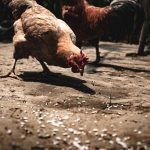Coyotes are highly adaptable and intelligent animals known for their cunning and resourcefulness. They are primarily nocturnal but can be active during the day, especially in areas with less human activity. Coyotes are opportunistic feeders, consuming a wide variety of foods including small mammals, birds, insects, fruits, and vegetables.
They also scavenge for food and take advantage of easy meals. Coyotes are territorial animals that mark their territory with urine and feces to communicate with other coyotes. They are highly social and often hunt and travel in packs.
Understanding coyote behavior is crucial for protecting chickens from these predators. Coyotes are skilled hunters with keen senses of smell and hearing to locate potential prey. They can dig and climb, making it important to secure chicken coops from all angles.
Coyotes are persistent and will continue attempting to access a food source if they believe it is worth the effort. Simply erecting a barrier may not be sufficient to deter them. It is important to recognize that coyotes are not inherently malicious but are simply trying to survive.
Understanding their behavior and motivations can help in better protecting chickens from these predators.
Table of Contents
Key Takeaways
- Coyotes are intelligent and adaptable animals that are primarily nocturnal and have a keen sense of smell and hearing.
- Securing the chicken coop with sturdy fencing, burying the fence underground, and using hardware cloth can help prevent coyote attacks.
- Deterrents and repellents such as motion-activated lights, noise machines, and chemical repellents can help keep coyotes away from the chicken coop.
- Guard animals like dogs, llamas, or donkeys can help protect the chickens from coyote attacks by alerting and deterring them.
- Removing attractants such as food, water, and shelter can help reduce the likelihood of coyotes being drawn to the chicken coop.
- Creating a secure perimeter around the chicken coop with fencing, motion-activated cameras, and regular inspections can help prevent coyote attacks.
- Monitoring and adapting strategies based on coyote behavior and activity can help ensure the ongoing safety of the chicken coop.
Securing the Chicken Coop
Inspect and Reinforce the Coop
Start by inspecting the coop for any potential entry points, such as holes, gaps, or weak spots in the fencing. Repair any damage and reinforce weak areas to prevent coyotes from gaining access.
Upgrade Your Fencing
Consider using hardware cloth instead of traditional chicken wire, as it is more durable and can withstand the efforts of a determined coyote. Additionally, consider burying the fencing at least 12 inches underground to prevent coyotes from digging underneath it.
Secure the Coop at Night
It is also important to secure the coop at night when coyotes are most active. Make sure all doors and windows are securely closed and locked, and consider installing motion-activated lights or alarms to deter any potential predators. If possible, consider adding a secondary barrier around the coop, such as an electric fence or a perimeter of gravel or rocks, to further discourage coyotes from attempting to breach the enclosure. By taking these measures, you can significantly reduce the risk of a coyote attack on your chickens.
Using Deterrents and Repellents

In addition to securing the chicken coop, using deterrents and repellents can help discourage coyotes from approaching your property. One effective method is to use scent-based deterrents, such as predator urine or commercial coyote repellent sprays. These products mimic the scent markings of larger predators and can help create the illusion that the area is already claimed by another animal, deterring coyotes from entering.
Another option is to use noise-based deterrents, such as motion-activated alarms or radios set to a talk station. The sudden noise can startle coyotes and make them think twice about approaching your property. Additionally, consider using visual deterrents, such as scarecrows or reflective tape, which can make coyotes feel exposed and vulnerable, causing them to avoid the area.
It is important to regularly rotate and change the location of these deterrents to prevent coyotes from becoming accustomed to them. By using a combination of scent-based, noise-based, and visual deterrents, you can create an environment that is unappealing to coyotes and reduce the likelihood of an attack on your chickens.
Implementing Guard Animals
Another effective strategy for protecting your chickens from coyote attacks is to implement guard animals, such as dogs or llamas, that can help deter predators. Dogs are natural predators of coyotes and their presence alone can be enough to keep them at bay. Consider getting a livestock guardian dog breed that is known for its protective instincts and ability to bond with chickens.
Llamas are also effective guard animals as they are territorial and will instinctively protect their flock from potential threats. When introducing guard animals to your property, it is important to properly train and socialize them with your chickens to ensure they do not pose a threat to the flock themselves. Additionally, provide adequate shelter and food for the guard animals to ensure they are healthy and able to perform their duties effectively.
By implementing guard animals on your property, you can add an extra layer of protection for your chickens and deter coyotes from approaching.
Removing Attractants
Coyotes are attracted to areas where they can easily find food, water, and shelter. By removing these attractants from your property, you can reduce the likelihood of a coyote attack on your chickens. Start by securing any potential food sources, such as garbage cans or compost piles, that may attract coyotes.
Keep all pet food indoors and ensure that any spilled birdseed or fruit from trees is promptly cleaned up. Additionally, eliminate any potential water sources that may attract coyotes, such as standing water in buckets or ponds. By removing these attractants, you can make your property less appealing to coyotes and reduce the likelihood of an attack on your chickens.
Creating a Secure Perimeter

Fencing Requirements
Start by installing a sturdy fence around the perimeter of your property that is at least 6 feet tall and extends underground to prevent digging. Consider adding rollers or angled fencing at the top of the fence to prevent coyotes from climbing over.
Regular Maintenance
It is also important to regularly inspect the perimeter for any potential entry points or weak spots in the fencing and repair them promptly.
Deterrent Measures
Additionally, consider adding motion-activated lights or alarms along the perimeter to deter any potential predators from approaching.
Monitoring and Adapting Strategies
Finally, it is important to regularly monitor the effectiveness of your strategies for protecting your chickens from coyote attacks and adapt as needed. Keep an eye on any signs of coyote activity around your property, such as tracks or scat, and adjust your deterrents or security measures accordingly. Consider rotating the location of deterrents regularly to prevent coyotes from becoming accustomed to them.
Additionally, stay informed about any changes in local coyote behavior or population dynamics that may affect their activity in your area. By staying vigilant and adapting your strategies as needed, you can effectively protect your chickens from coyote attacks and ensure their safety on your property.
If you’re looking for ways to keep coyotes away from your free range chickens, you may also be interested in learning about the importance of the size of your chicken coop door. A properly sized door can help keep predators out and your chickens safe. Check out this article on poultrywizard.com for more information on how to protect your flock.
FAQs
What are coyotes?
Coyotes are a species of wild canine found throughout North America. They are known for their adaptability and opportunistic feeding habits.
Why are coyotes a threat to free range chickens?
Coyotes are known to prey on small animals, including chickens. They can pose a threat to free range chickens by hunting and killing them.
What are some methods to keep coyotes away from free range chickens?
Some methods to keep coyotes away from free range chickens include using secure fencing, installing motion-activated lights or sound devices, using guard animals such as dogs or llamas, and removing attractants such as food scraps.
Are there any natural deterrents for coyotes?
Some natural deterrents for coyotes include using strong-smelling substances such as predator urine or citrus peels, and creating a barrier of thorny or prickly plants around the chicken coop.
What should I do if I encounter a coyote near my free range chickens?
If you encounter a coyote near your free range chickens, it is important to remain calm and not approach the animal. Make loud noises, wave your arms, and throw objects to scare the coyote away. If the coyote does not leave, contact local wildlife authorities for assistance.
Meet Walter, the feathered-friend fanatic of Florida! Nestled in the sunshine state, Walter struts through life with his feathered companions, clucking his way to happiness. With a coop that’s fancier than a five-star hotel, he’s the Don Juan of the chicken world. When he’s not teaching his hens to do the cha-cha, you’ll find him in a heated debate with his prized rooster, Sir Clucks-a-Lot. Walter’s poultry passion is no yolk; he’s the sunny-side-up guy you never knew you needed in your flock of friends!







